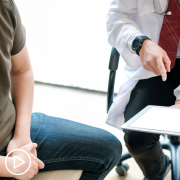MPNs and Coronavirus: What Patients Should Know
MPNs and Coronavirus: What Patients Should Know from Patient Empowerment Network on Vimeo.
Dr. Srdan Verstovsek provides guidance for patients with myeloproliferative neoplasms (MPNs) related to coronavirus (COVID-19), stressing the necessity of continued communication with their healthcare team.
Dr. Srdan Verstovsek is Chief of the Section for Myeloproliferative Neoplasms in the Department of Leukemia at The University of Texas MD Anderson Cancer Center. Learn more about Dr. Verstovsek, here.
Related Resources

An Expert Shares Key Steps to Take Following an MPN Diagnosis |

|

|
Transcript:
Dr. Srdan Verstovsek:
When we come to the COVID pandemic here, and the effect on our patients with myeloproliferative neoplasms, of course, that is something that is very serious. Our patients, particularly those with advanced myelofibrosis, are at a high risk of having complications from infection if they get infection. Perhaps less so for patients with ET and PV, which are more healthier, if you like, although they have myeloproliferative neoplasms.
So, our focus here is, first of all, like it is for anybody else, including myself, on prevention.
Obviously, that would be common sense and logical to try to prevent getting infected. And then, also to try to be in best possible health. Taking medications as prescribed. Being in touch with your doctor. If you cannot come to a physical exam, which is understandable because of possible increased risk through the transportation perhaps, then being in touch through telemedicine. We call, and we see our patients online. That is fine. We can do the bloodwork from the distance.
So, taking medications, being fit, and being as healthy as you can with the disease. But taking medications and controlling your risks, not allowing disease to take ahold of you, and then you get infection and you’re gonna be in trouble.
So, really communications with the doctors, taking medications, and I would say, occasional, with all precautions, visits.
Because, for example, with myelofibrosis patients, I really need to feel that spleen and the liver and see how is the patient’s weight, and not only ask over the telephone, what’s your symptoms are, or what your blood count is. I can see this on the computer. We really need, occasionally, myelofibrosis patients to come over to our clinic to be examined.
And here, in the clinic, we have extraordinary precautions. No visitors. No people to accompany patients in. So, to minimize any interactions with anybody who possible can bring any undesirable infections through the door, not just COVID, but any other. And the staff is prepared to provide excellent care with protection that is in place.
So, I think that will be my message: Prevention; staying on top of your disease; being in best possible shape with the disease; staying in touch with your doctor; and, occasionally, still visit the doctor if at all possible, particularly for myelofibrosis patients.










